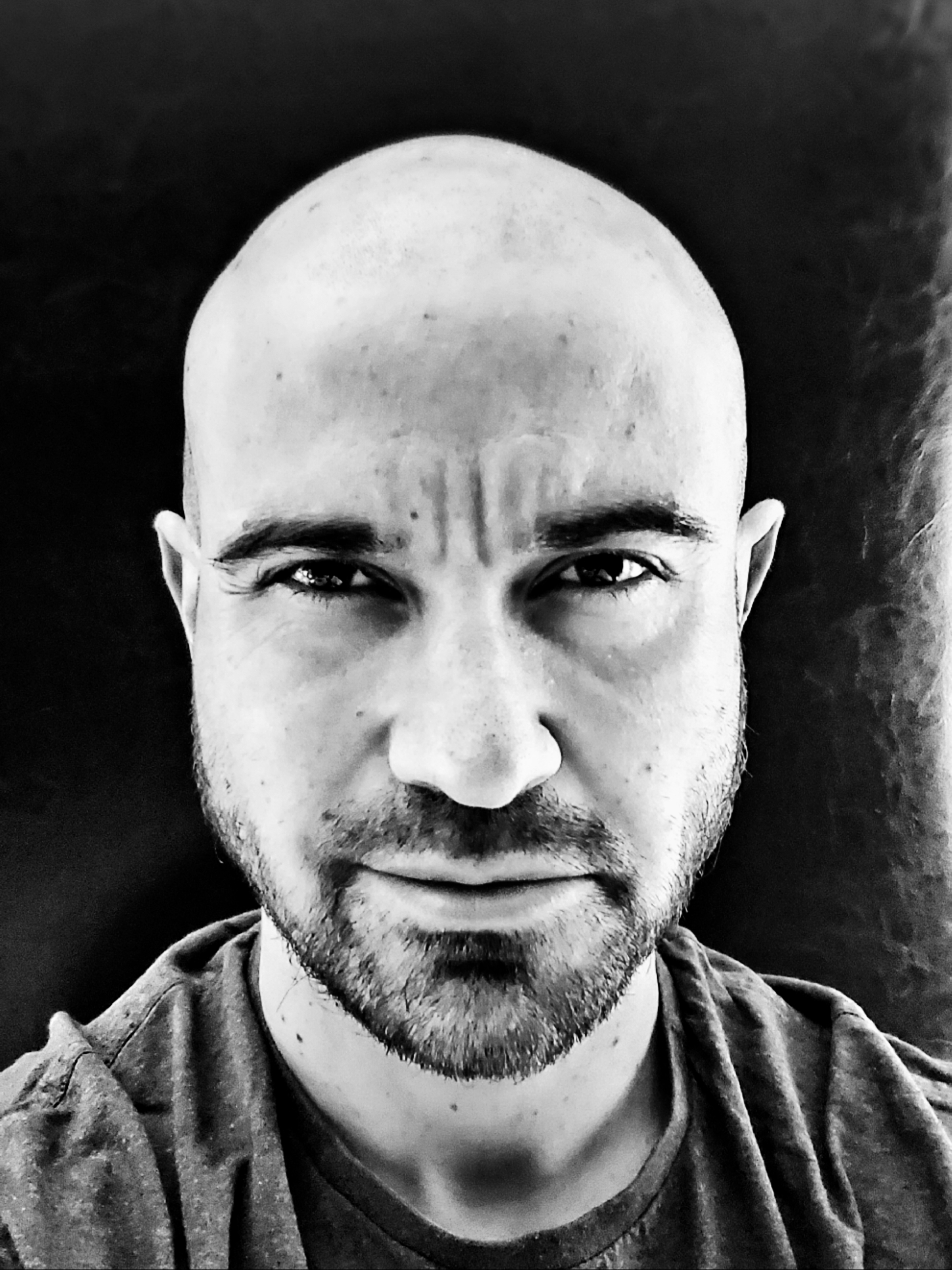 It’s a sunny day in Washington, D.C. and Mikail Chowdhury is perched in the great outdoors with a running fountain seeping into the landscape. Contrasting with the dreary bad British weather where I’m dunked, I couldn’t help but feel a touch of envy of Mikail’s environment as he joined me on Zoom.
It’s a sunny day in Washington, D.C. and Mikail Chowdhury is perched in the great outdoors with a running fountain seeping into the landscape. Contrasting with the dreary bad British weather where I’m dunked, I couldn’t help but feel a touch of envy of Mikail’s environment as he joined me on Zoom.
He was here to talk about Aimee Victoria, his latest short which was filmed during lockdown in 2020, and created entirely remotely using a cellphone. “To be precise, my wife’s cellphone. Just to be clear on that one, thank you to my wife again for letting us use that,” Mikail muses.
Aimee Victoria is about a relationship between two women of colour who are both deaf. About the film, Mikail explains the short as a “nice romantic love story” that exposes the vulnerabilities of two people in a relationship during a pandemic. “It’s about them facing up to the fact they have to open up to each other and finding a way to do that long-distance.”
Mikail faced his own personal journey with finding inspiration to write Aimee Victoria, especially in the face of a global pandemic which ground the film industry (and the world) to a halt. He recollects: “In March 2020, everything was normal more or less. I actually had a table-read with an audience for a feature film that I am developing, and everything was going very smoothly. That was the last Saturday night before lockdown kicked in.”
“As I always say, there was a group of 30 people who will never get back their last Saturday night of freedom for two years because they were listening to my screenplay’s second draft performed by a very talented group of actors,” he jokes.
When lockdown hit, Mikail spent the first week like most – feeling a bit forlorn. Soon after, Mikail decided to just make something out of this isolating situation. He reached out to a few people in an email titled ‘Bonkers Idea’. The concept soon evolved into a short-form series called ‘The Myth of Control’, and gave the chance for as many people as possible to be creative during that difficult time. At the time, Mikail “naively thought everything would be back to normal by October 2020. We were not.”
One of the episodes fashioned the bones of Aimee Victoria. The episode proved to be a popular one, so the production team decided to make it into a short film so they could access the festival circuit. So, they recut Aimee Victoria. Now, the film has been selected for over 25 film festivals (including 2 Oscar-qualifying ones), screened at BFI Southbank for their ‘Busting the Bias’ showcase and has won a couple of awards along the way.
He recollects the production as a “remarkable effort by an amazing team of people who came together and were willing to have a lot of patience and understanding”. Mikail’s humble gratitude is echoed throughout our entire conversation.
“Remember this was a time where we were pumping bleach onto our groceries in the doorways of our houses, and wearing rubber gloves to the supermarket – it was ultra, ultra lockdown. We worked with some incredible people. Honestly, I can take so little credit for this film because there were so many brilliant people who put their time and energy into it”.
The production team had a technical supervisor, Sebastian Gilligan-Kim, who was on the virtual set every day, guiding the cast and make-shift crew on what they had to do.
They also had some advice from Oscar-nominated cinematographer and producer, Luke Geissbuhler, who spoke with them about navigating their production during a global pandemic.
Mikail jointly showran the series with Sana Soni, a friend and executive at 1091 Pictures, and it was the directorial debut of the well known actress Chrystee Pharris (Scrubs, Passions, Goliath, Monogamy).
For Aimee Victoria, they settled on the cellphone as a filming device due to its relative ease of use. “If we’re going to send a camera to somebody who has never used a camera before, then we can send them a DSLR, but it’s much more complicated – they have to change lenses. But if we can do this on a cellphone, everyone knows how to use a cellphone and everyone is comfortable with using a cellphone camera”. This decision led to them finding out about a paid app called FiLMiC Pro, an advanced mobile filming app that provided pro-level features such as an unlocked ISO, framerate controls and advanced audio options.
Mikail himself wishes there were phones back when he was younger getting started. “There’s no excuse for anyone not to make a film now, you can edit on your phone even. You can do everything on that.” You don’t even have to buy FiLMiC Pro, as he feels that the default camera app can now provide excellent footage.
“It’s a great democratized gift we’ve been given now”
When it came to filming Aimee Victoria, Mikail describes to me a succinct military-style operation. Firstly, it involves his wife’s wiped iPhone being placed in a box with some softbox lights, tripods and leads. The box is then sent to each actor in turn with a rigorous routine to follow. Open the box, sanitize, use it, re-sanitize again, put it back in the box, await an Uber/Lyft’s arrival, pop the boot (so they don’t have to interact with the driver), and off away the equipment goes to the next actor’s abode to complete the same ritual.
Each actor had to provide someone from their quarantine bubble who would be prepared to shoot it. Many of the crew hadn’t ever stepped onto a film set before, let alone been tasked with shooting an entire short film. The video footage was fed into a laptop and streamed over Zoom, and according to Mikail this was all very variable depending on “the Gods of WiFi each day”.
About the concept of the characters, Mikail discusses his strong interest in coming up with characters, stories, and perspectives we don’t typically see on screen. This also comes with its problems – especially in the film industry. “I don’t like to put diversity in as a tokenistic effort,” he says.
“I think it has to be true to the character, even if it is not relevant to the story. But that character is naturally going to have different experiences, and their behaviour will be naturally different as it goes through,” he adds.
When Mikail was writing Aimee Victoria, he realised “I really hadn’t seen anything, CODA hadn’t been realised or wasn’t on the radar at the time, so I had not seen anything really with deaf characters featuring in it aside from Four Weddings and a Funeral many many years ago, where Hugh Grant’s brother was a deaf character”.
“So I wrote this character who was deaf, and we have her interacting with her hearing friends on a Zoom call. We have her interacting with a character who is hearing using VRS, a video relay service, which is a way deaf people communicate with hearing people – and hearing people communicate with deaf people [a scene created by the film’s co-writer, Hannah Harmison].” When it came to the development of the story, it then became a romantic tale.
Again, singing praises of his collaborators and team – Mikail highlights the phenomenal work of his co-writer, Hannah Harmison. “[Harmison] took the outline of the story and the characters, and she made this really beautiful story. Hannah herself, she isn’t deaf, but she works with the deaf community, she knows American Sign Language, and was able to bring a ton of knowledge and authenticity. We then obviously ran the script past both of our deaf actresses, to make sure they were comfortable with it and that we had accurately represented everything.”
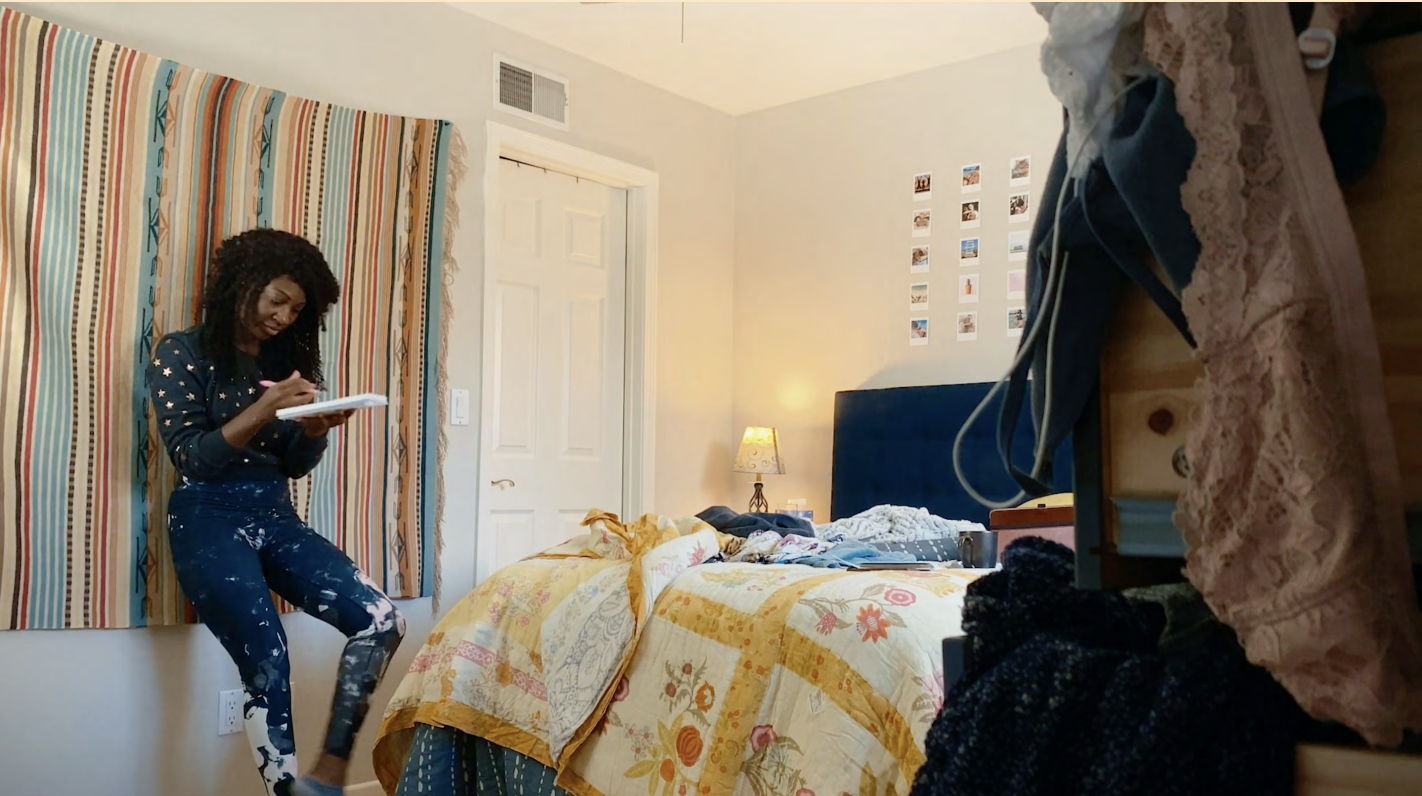 Still from Aimee Victoria
Still from Aimee VictoriaAdding onto that, there is a particularly powerful balcony scene in Aimee Victoria that is rarely shown on screen, where Aimee performs a poem through ASL and it is unsubtitled. When asked what motivated that choice, Mikail exclaims “Thank you, I’m really glad that worked!”
Mikail then begins to uncover that specific process: “You know full well that when you’re making a film, or any art, it’s choices. You have choices to make.”
He continues: “There is actually a cut of that film where there are no subtitles throughout the entire film. We thought ‘well, let’s just try it and see what that would be like’ and it worked to a degree in the sense that people understood the story because it’s a simple story. In that scene, we went back-and-forth on whether to subtitle it and in the end, I’m very pleased with our decision.”
When Mikail was conceiving the storyline, that special balcony moment was “very much to have a very classic kind of rom-com gesture at the end of it”. It was filmed at the end of the day to get the just-right golden hour glow. “Even when we shot that, I was watching it and I thought ‘I think we’ve got something really cool here.’”
When Mikail was growing up, and even to this day, he never saw people like him or his family on-screen (especially the women in his family). He was born in Bangladesh and grew up in London, he is Muslim and mixed-race – part Mexican, part Bangladesh, and part British. When Mikail did see people like his parents on-screen they tended to be in very specific roles. “They don’t tend to be just living their life, doing their normal thing – which of course, we all do. Whatever strife we face, whatever makeup or background – it’s not that we spend our entire lives battling these demons every single moment, every single day. We’re buying a sandwich, or you know watching Netflix.”
It’s this mundaneness that Mikail captures in his work. He starts from a place of finding what is an interesting take on a character. What don’t we see enough? Mikail also wants to fundamentally bring authenticity behind the camera too.
"It’s right to increase representation in front of and behind the camera"
To combat the film industry’s status quo, he has been doing diversity, equality and inclusion work for many years now, including founding an origins network and becoming the chair of a Pan-Asian group.
When it comes to discussing representation in the film industry, Mikail likes to look at data to justify the means. The CAA, one of the biggest talent agencies in the world, compiled a study of about 400 films a few years ago. They found that in front of the screen where there are increased levels of diverse representation, films will typically over-perform in comparison to those that do not: “They simply made more money … the fact is the numbers don’t lie,” he bounces back.
In the US, Studio System is a data system that records production information, from who made it to how much money they made. Big studios and companies pay subscription fees to it so they can draw information from it. One of the founders found that if you have diversity in key positions behind the camera, on average, you’re increasing the revenue of your films versus those that don’t have it by up to 30%.
The industry is turning in that direction and particularly in the States, according to Mikail: “My old boss in business used to use a phrase ‘The right thing to do, is usually the best thing to do for your company’. It’s the right thing to increase representation in front of and behind the camera, it also happens to be from a business standpoint and perspective.”
He states: “And then you can get into the conversation of should they be doing it because it’s the right thing? Is it a bit disingenuous because they’re doing it to try and make money? I’d argue for whatever reason, it’s a positive change and it’s starting to get in there.”
In Mikail’s eyes, if the financial reality pushes the industry (which it seems to be doing) then so be it. “It will start to build, hopefully now, a generation of filmmakers who didn’t get the shots and opportunities that they should’ve done before,” he adds.
When Mikail started out, it was in music but he later became a lawyer because his father always said to him: “You know there will be people who don’t want you to be here and don’t want you to be not only in the country, but not even in the city, and they won’t want you in a workplace – you need to have something that no one can take away, whatever else happens.” For Mikail’s father, that was having a profession, a career.
So, Mikail ended up becoming a lawyer, although, whilst studying he started hanging out with the drama crowd and tested out some acting, improv and a bit of directing. He also decided to make his first play into a film.
This was a time when technology was not where it is now. For one, there were no cellphones – and for Mikail, this was the “best possible thing”, as had there been anyone around to tell him how to do it, then he would’ve never got that film made. He had £500 from Dundee City Council, cast actors from his university’s student body, and used a mate’s apartment. They shot it using a rented camera from a local place, they even had a make-shift boom mic no one really knew how to use. When it came to sound recording, they had no clue how to use mixing, so just recorded it straight into the camera – some classic and incredibly relatable first filmmaking memories.
Mikail used to sneak into the basement of the animation school at 5am, before classes started, to use the editing suite – all so the film was completed. He’d disappear at 9am when classes started, then would come back when classes were over and work until he was kicked out. What’s more, when the final edit was complete – the security guards and animation students were confused why Mikail wasn’t showing up anymore because they thought he was a fellow student there.
Looking back on just how “absurd” his first feature film production was: “Somebody somewhere heard that what you can do to diffuse light is to stick a piece of greaseproof paper, like parchment paper, on a lamp. So you’ve got all these students standing around holding lamps with greaseproof paper on top of them – like we’re so professional,” he laughs.
So what’s next for Mikail Chowdhury?
Nowadays, he’s turning his mind back to features once again. This includes early development of an Aimee Victoria feature, getting his pre-Covid feature ‘Anything You Lose’ back into development, and working towards a feature he’s set to direct that is written by Marcos James (Game of Thrones) and being shot in Jamaica. Just a casual directing job in Jamaica, “definitely the kind of gig you’d want to get,” Mikail beams.
Mikail is also a Producer on a new short film, Good Girls Get Fed, with a majority female team written, directed by and starring Kelly Lou Dennis in LA which is a proof of concept for a feature franchise.
As the conversation comes to a close, it is clear that this isn’t the last time we’ll be hearing the name, Mikail Chowdhury. His self-dubbed ‘random’ journey into filmmaking is enough to make anyone pick up their own phone and make a film.

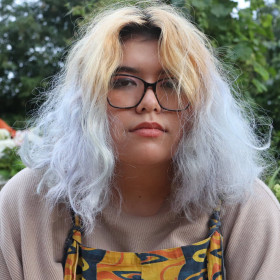
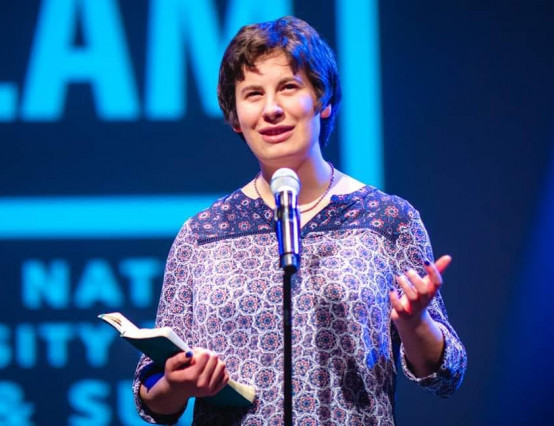
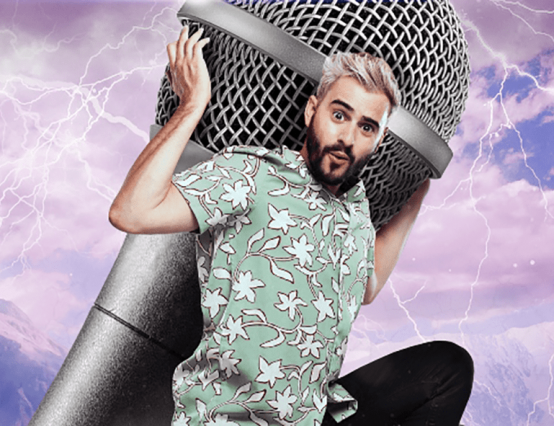
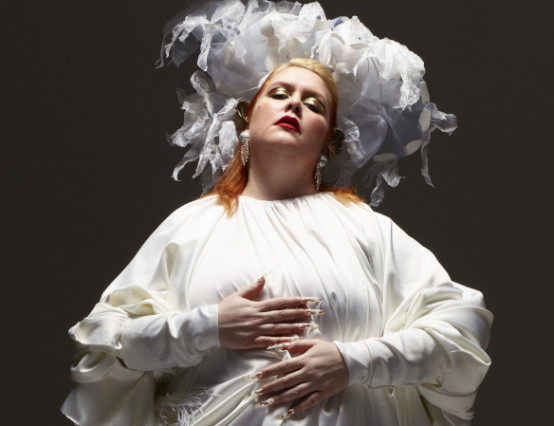
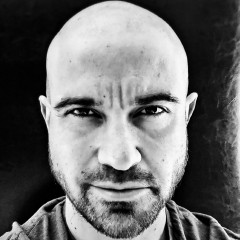


0 Comments